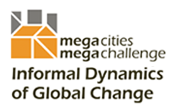Natural hazards and climate change in Dhaka: future trends, social adaptation and informal dynamics
Many megacities in the world, including Dhaka, are regularly threatened by natural hazards. Risks associated with floods and cyclones in particular are expected to increase in the years to come because of the impacts of global climate change and rapid urbanization. In Greater Dhaka the sprawl of slums and informal settlements is primarily taking place in wetlands, swamps and other high-risk areas, with little attempt being made to limit the environmental impairments. An increase of precipitation extremes and tropical cyclones, together with a growing vulnerability of the urban population puts considerable stress on the adaptability and resilience of the social and economic system. In the past, Dhaka has shown an impressive overall adaptability to external shocks.
The project will analyze the factors behind this relative ‘stability’. Another major objective of the research is to link models on future climate change and weather extremes to analyses of informal social and economic adaptation strategies on a micro-level. To achieve these objectives, the project applies different methodologies that are nevertheless closely related to each other: meteorological modeling as well as micro-level social and economic field research.
Research team
Meteorological Institute, University of Bonn
Prof. Dr. Clemens Simmer
PhD. cand. Insa Thiele-Eich
Department for Geography, University of Cologne
Prof. Dr. Boris Braun
PhD. cand. Tibor Aßheuer
Local Partners
Department of Geography and Environmental Studies, University of Rajshahi
Prof. Dr. Raquib Ahmed
Prof. Dr. AZM Shoeb
Department of Geography and Environment (Dhaka University)
Prof. Dr. Ashraf Dewan


